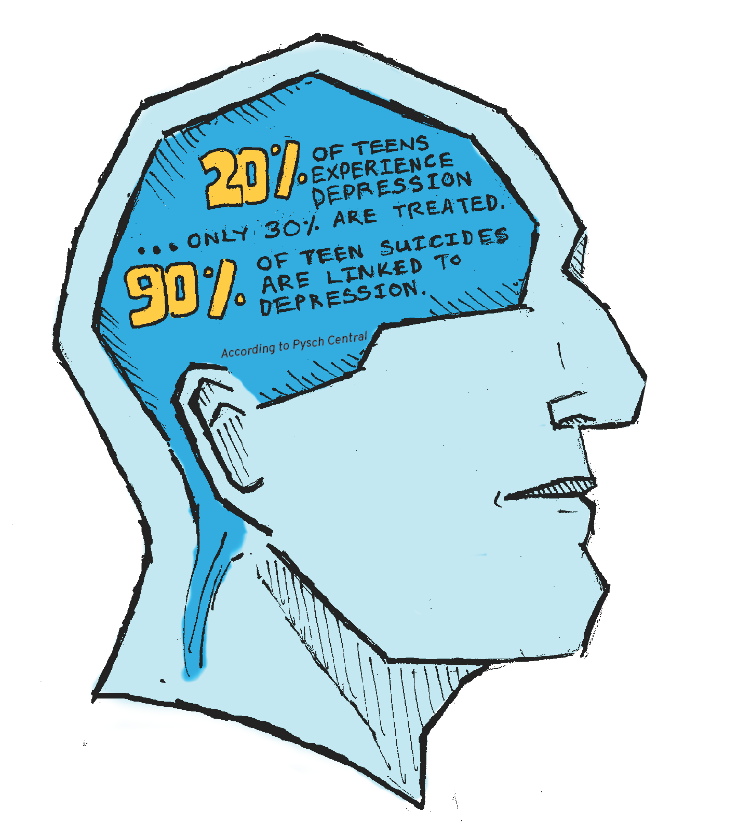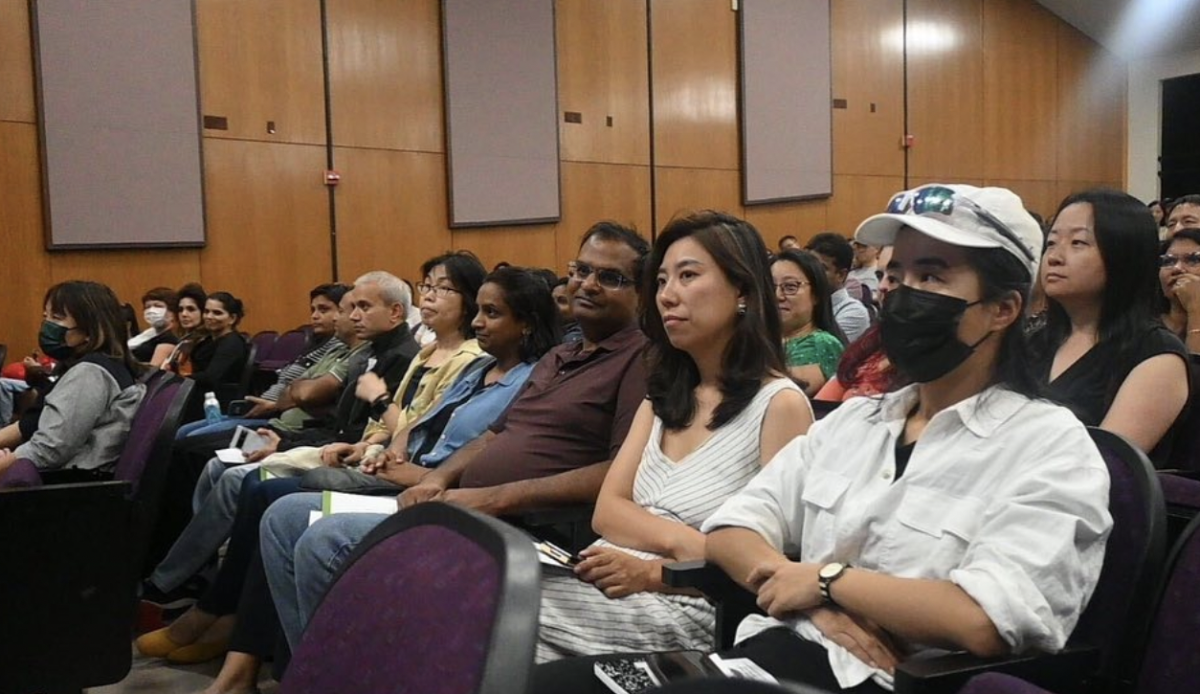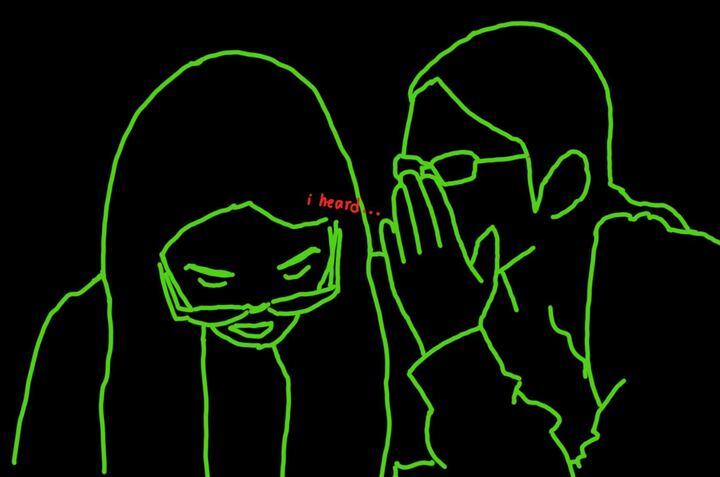We perceive depression as a state in which the person is detached and feels hopeless. Actually, a depressed student could also be extremely agitated. There are various levels of depression, and it shouldnít be overlooked and simplified. Symptoms have wide ranges, according to Psych Central. Teens with depression may display hopelessness, social isolation, increased irritability, poor concentration or self-injury. However, someone with depression canít simply be characterized as socially withdrawn. They may possibly be externally outgoing and carefree to hide their depression. One tragic case was Robin Williams; it may be hard to fathom, but even as an actor and comedian, he had depression and committed suicide.
 “We tend to create categories and stereotypes around certain mental illnesses. That is, many people assume that teens with depression are troublemakers, loners, nerds or artsy types. But depression does not discriminate […] it affects all types of teens,” Psych Central reports.
“We tend to create categories and stereotypes around certain mental illnesses. That is, many people assume that teens with depression are troublemakers, loners, nerds or artsy types. But depression does not discriminate […] it affects all types of teens,” Psych Central reports.
It’s about looking past the surface, recognizing peers may possibly be depressed and reaching out. Itís no question that life is often fast-paced. When we ask each other how we feel, we should look for hidden troubles. Student advocate Richard Prinz states that often those who face depression hide their feelings in fear of burdening others or drawing attention. To help them, we have to stay on the lookout, but there comes a limit to how prepared we are to help other students.
“One problem is that there are people who really want to help […] but most of us donít have a lot of training in being a caregiver, so they get brought down too,” Prinz said. “They start losing concentration and their grades start going down.”
Getting adults involved is essential in these sensitive situations. We can report what we observe to Prinz, a guidance counselor, or our school psychologists. In some cases, the student may ask for you to keep their depression a secret. But in those situations we have a right and should break confidentiality to let an adult know. A few years ago, student Veronica Gunawan from the class of 2008 received help for her depressed friend and wrote a document titled “The Declaration of Mind of Reason”, stating our rights as students to break confidentiality and solicit help for those who are depressed and possibly self-mutilating.
“When in the course of hearing any words connected to the term self-mutilation or suicide, the observer has the right, regardless of his or her position, to report it to a helpful adult or any other source that can help the depressed or suicidal individual,” the Declaration of Mind and Reason states.
If we don’t feel comfortable going to parents, that doesnít mean we should stop trying to get help. Find a support system that does work for us. As peers, we can find a trustworthy adult on campus that will give support and assist the student with depression. The student with depression may be unwilling to reach out for help or even unknowing that he or she has depression; we can help them if we stay on the lookout and raise awareness.
Harvard Health Publications states that the neurology of depression is strongly influenced by genetics and personality. Depression affects regions of the brain such as the Amygdala, responsible for moods including fear and sorrow, the thalamus, in charge of thinking and behavior and the hippocampus, accountable for memory recollection. But they also state that our temperament and willingness to seek help can be malleable.
“Cognitive psychologists point out that your view of the world and, in particular, your unacknowledged assumptions about how the world works also influence how you feel,” Harvard Medicine reports.
Part of lessening feelings of hopelessness is evaluating our definitions of success. If we solely derive our satisfaction from getting straight Aís, what happens if we get a B? If we fall behind? We could possibly disempower and strictly categorize ourselves. Regardless of influences on our beliefs and values, there is something that cannot be taken away from us — choice. A choice to shape our temperament and have an open, accepting outlook. That outlook has more impact on our peers than we think. Achievements shouldnít determine our happiness or our approval of each other. We may not have had a choice in feeling depressed, but we have a choice to try to tackle it. Student advocate Richard Prinz believes students should evaluate and practice looking into their emotional states.
“We might blame the school or feel unworthy, and itís based on the idea that we have to get an A,” Prinz said. “[There’s the idea that] if we work hard and get into a good school, then later weíll be happy instead of we need to be happy first.”
In raising our awareness of depression, we must lessen the stigma surrounding it. Sometimes parents of depressed students may not recognize their child needs help or depression may be stigmatized in a certain culture. Gracepoint Mental Health Foundation notes that some cultures may pathologize depression or reject acknowledging depression as it may be a perceived as shameful.
“Because the public discourse regarding depression is more prevalent in Western societies, it is more socially acceptable to have depression, and more people are willing to seek help. In contrast, mental illness is often more stigmatized in other cultures. As a result, people and their families may deny mental illness out of shame of being identified as crazy. Others may find the label depression morally unacceptable, shameful, and experientially meaningless. Treatment for depression may be actively resisted by someone who comes out of this sort of culture,” Gracepoint Mental Health Foundation says.
In his parenting class, Prinz gives homework for the parents to simply observe their childís emotions.
“This one parent came back and said that she’d never done that [observed her child’s emotions] before,” Prinz said. “I think some cultures don’t have the practice of being self-reflective or paying attention to our emotional state and how we think.”
 Medication shouldnít be stigmatized either, as it often helps the person with depression and can really improve their overall emotional state, Pysch Central states. Taking these factors into consideration, we should stay aware and realize that peers coping with depression may not be getting the help they need.
Medication shouldnít be stigmatized either, as it often helps the person with depression and can really improve their overall emotional state, Pysch Central states. Taking these factors into consideration, we should stay aware and realize that peers coping with depression may not be getting the help they need.
We can open ourselves to examine our feelings and how we interact with our peers. And realize that depression is complicated. What we can do is stay on the lookout.
In our classrooms, any peer could be coping with depression. Negative statements may leave more impact than we intend. And know that there is always another solution, even if you can’t see it right now.




















